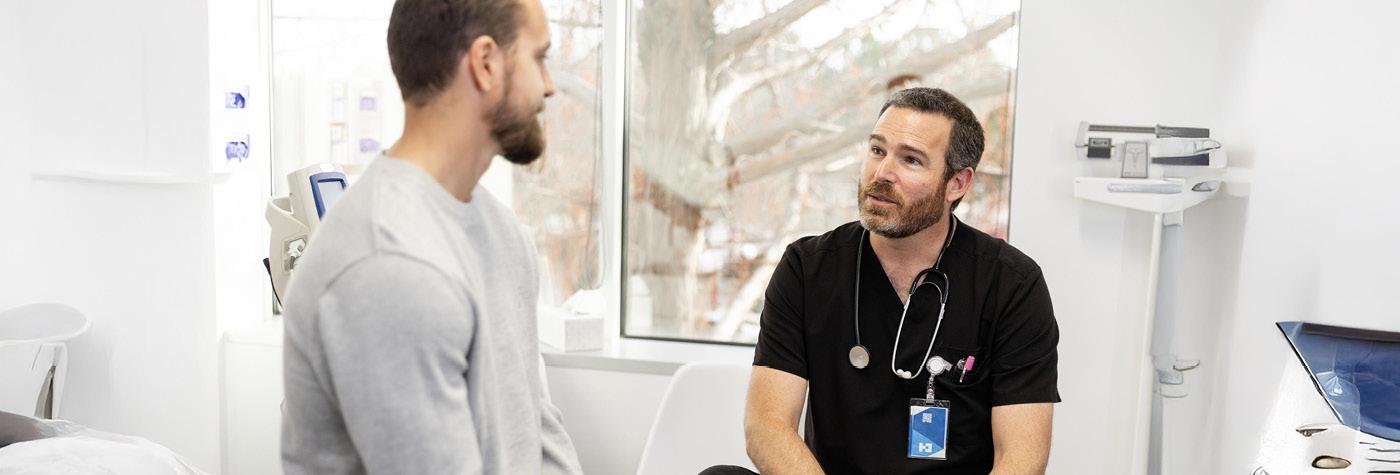If you or someone around you is experiencing signs of a heart attack, such as chest pain, shortness of breath, nausea, or discomfort in the arms, neck, jaw or back, call 911 immediately. Do not wait or try to drive yourself to the hospital. Every second counts, and emergency responders can begin life-saving treatment on the way to the hospital.

When oxygen-rich blood can’t reach the heart because of a blockage, you can have a heart attack. This is also known as a myocardial infarction. A non-ST-elevation myocardial infarction (NSTEMI) is a specific type of heart attack. The name NSTEMI comes from how this type of heart attack shows up on an electrocardiogram (ECG) — a test that measures the electrical activity in the heart. That’s where the condition’s name comes into play. The “ST-segment” references a section of the reading on an electrocardiogram. When you have an NSTEMI, the ST elevation electrical pattern can’t be easily identified.
Any heart attack, including an NSTEMI, is a life-threatening medical emergency. If you or someone you know is experiencing symptoms of a heart attack, call 911 immediately. Quick evaluation and treatment could prevent permanent damage to the heart or even death. The cardiologists and cardiac surgery teams working with UK HealthCare’s emergency departments are experts in treating acute NSTEMI. Following this type of heart attack, our heart specialists at the UK Gill Heart & Vascular Institute can work with you to optimize your heart health.
When you have a heart attack, you may experience one or more of these symptoms:
- Chest pain, pressure or tightness
- Pain that radiates to the shoulder, arm, jaw or neck or, in rare cases, the back or stomach
- Shortness of breath
- Sweating or feeling clammy
- Dizziness, lightheadedness or fainting
- Nausea, vomiting
- Stomach discomfort that could feel like heartburn or indigestion
- Fatigue
It is important to understand that women often have different and less severe symptoms than men. They may never have chest pain, and most often have discomfort in the shoulder, arm, neck or back, nausea, fatigue or severe headache.
If you have these symptoms or think you may be having a heart attack, call 911 right away. Do not try to drive yourself to the hospital and instead wait for EMS to arrive.
The prognosis for people who have had an NSTEMI varies. Older people can have a poorer outcome compared with younger age groups.
By acting now, you may be able to delay or even prevent a heart attack. The best way to reduce your risk is to stay as healthy as possible.
- Get regular checkups to screen for conditions that can affect heart health.
- Work with your healthcare provider to properly manage chronic health conditions such as diabetes, high cholesterol, high blood pressure or heart disease.
- Make lifestyle changes to lower your risk for having a heart attack.
Lifestyle changes
Lifestyle changes are often recommended to help patients manage symptoms, reduce complications and improve heart health. Talk with your provider about how these heart-healthy changes can help.
- Eat a healthy diet. Enjoy plenty of fruits and vegetables, lean meats, nuts, beans, fish and whole grains. Limit sodium, added sugars and unhealthy fats.
- If you smoke, quit. Smoking can increase your risk for heart attack and stroke. Avoid vaping and secondhand smoke as well.
- Keep updated on vaccines. Ask your provider about flu, COVID-19 and other vaccines that can help you avoid illness.
- Limit alcohol. Men should have no more than two drinks per day, and women should aim for no more than one drink each day.
- Manage other health problems. Take medicine for high blood pressure and diabetes and follow your provider’s guidance.
- Sleep well every night. Aim for seven to nine hours of good sleep per night.
- Stay physically active. Try to get at least 30 minutes of moderate exercise five days a week. Talk to your provider about what exercises are good for you. Be sure to watch for signs that your heart is working too hard. If you become short of breath or dizzy while exercising, stop and rest.
- Watch your weight. Take steps to reach and maintain a healthy weight.
Risk factors for NSTEMI include health issues, lifestyle and factors you can’t control.
Health issues
- Aortic stenosis, a narrowing of the aortic valve
- Myocarditis, inflammation of the heart muscle
- Previous history of stroke or coronary artery disease
- Pulmonary embolism, a blood clot in the lung
- Tachycardia, a fast heart rate
Modifiable risk factors (things you can change)
- Alcohol use
- Diabetes
- High blood pressure
- High cholesterol
- Excess weight
- Poor diet
- Recreational drug use
- Sedentary lifestyle
- Smoking
Non-modifiable risk factors (things you cannot change)
- Age, especially over 45 for men or over 50 for women
- Family history of heart attack, coronary artery disease or stroke
- Inherited conditions that increase your risk of blood clots or heart attack
- Sex, as NSTEMI typically occurs earlier in men
As the area’s most advanced emergency department — and home to the UK Gill Heart & Vascular Institute — UK Albert B. Chandler Hospital is the preferred choice for patients experiencing emergency, life-threatening cardiac events. Whether you arrive by ambulance or are transferred from another hospital, you can rest assured that you are in the hands of the region’s most advanced interventional cardiology team.
By the time you get to the hospital via emergency transport, Emergency Medical Services or the team that facilitated your transfer will have shared your symptoms and any known diagnosis with our emergency department.
Patients experiencing heart attack symptoms bypass our emergency room and are taken to the cardiac catheterization lab to reduce the time it takes to start treatment. For heart patients taken to our emergency department, our team of emergency medicine doctors and interventional cardiologists are ready to provide imaging exams, bloodwork, additional tests or any needed emergency procedures.
Following emergency treatment, you may recover in our Cardiovascular Intensive Care Unit before being transferred to your hospital room. Once you are ready to go home or to an inpatient rehabilitation hospital, you will be assigned a UK Gill Heart & Vascular Institute cardiologist for any ongoing care needed.
Our interventional cardiology team helps patients regain good heart health every day. We also participate in clinical trials to enhance interventional cardiology treatment and management in the future.
Our team engages in trials to investigate new advances. Because of this, you have access to the latest treatment options available.
If you’re a candidate for an ongoing trial, your care team will discuss this option with you.










